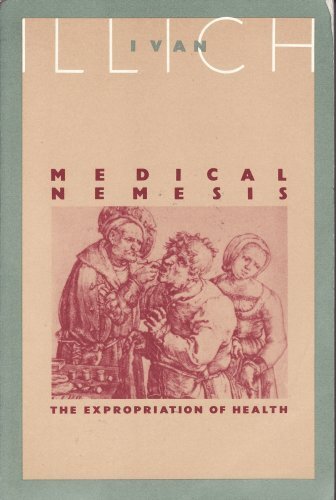First, do no medicine
“Modern medicine is a negation of health. It isn't organized to serve human health, but only itself, as an institution. It makes more people sick than it heals.”
― Ivan Illich
It’s just three little words. Well-intentioned, professional, conservative words. A news story about health presents the pros and cons of some kind of body-related treatment and concludes with the advice to “See your doctor.”
In conventional media, journalists and editors are counseled to include this boilerplate warning as a buffer against legal action. The invisible commandment is clear: Do not dispense health advice directly to readers. You may discuss medical issues, but always point readers back to the medical industry. If you follow this practice, you can avoid litigation.
On one level, it seems responsible and harmless. Doctors are considered to be authorities on the body and it seems prudent to point people towards their expert advice. But when this counsel is repeated across thousands of stories, radio reports and magazine articles, it begins to take on a life of its own. It becomes a cultural directive with profound consequences for how we relate to our bodies and our lives.
The constant drumbeat to “see your doctor” doesn’t just steer people towards expert advice; it simultaneously steers us away from our own native capabilities. It suggests that the medical industry is the sole authority in matters of our health. And when we internalize this belief, we lose faith in our own powers of adaptability. We give away our inborn plasticity to a vast, impersonal system. We give away our animal nature. In this respect, modern medicine produces the precise opposite of what it intends.
It’s not that modern medicine doesn’t work. The real problem is that modern medicine actually works too well. And because it works so well, we’re using it far more often than we really should. Consider the history: It wasn’t that long ago that medicine was almost totally ineffective for any human ailment. Prior to the age of antibiotics, cures were mostly imaginary. When people contracted a disease or injury, the only real option was to fight their way through the adversity.
All that changed in the 1940’s, when penicillin became widely available. Suddenly, medicine began a steep ascendance in power and respectability. The promise was immense. Perhaps all disease could be eradicated. Never again would people have to suffer pain, illness or discomfort. The dream was an easy sell, of course, but as medicine became increasingly effective, so did our use of it. More and more human afflictions were incorporated into the category of “illness.” Childbirth, aging, sagging skin, low libido and death were increasingly seen as treatable conditions. In the process, the entire human experience was transformed. Our increasing reliance on medicine began to deprive our bodies of the challenge we need for adaptation.
This shadow side of modern medicine was famously noted by Ivan Illich in his classic Medical Nemesis. For Illich, modern medicine causes as much suffering as it cures. Most importantly, it disempowers the human animal. When every affliction is treated, the body is no longer challenged to exercise its powers of adaptability. And when these powers go unused, they go dormant. The end result is a population with a growing inability to adapt.
Obviously, modern medicine does have value. But for those of us who want to maintain our vitality and adaptability, the solution is to demedicalize our lives as much as we can. Not only should we cut back on excessive use of medical care, we should also stop thinking of our lives in exclusively medical terms.
Begin by paying attention to the way that medicalization has crept into our language: Exercise is medicine. Food is medicine. Sunshine is medicine. Friends are medicine. On their own, these statements seem perfectly innocent, but when seen as part of a larger view of the human experience, they reveal a disturbing shift in identity. Do we really see ourselves as chronically sick, in constant need of medical care? What happens to the human experience when we start from an assumption of illness?
The problem with medicalization is that it leap-frogs our natural adaptive power. When every ailment is treated, people no longer need to fight their way through difficult or painful experiences. And when there’s no fight, there’s no adaptation. When the challenge disappears, the body has no incentive to reorganize itself to a higher level of function.
The solution, of course, is to put ourselves back into contact with challenge. Our bodies are far more adaptive than most people imagine. Not only are we good at enduring hardship, we’re also good at engineering physiological work-arounds that take us to new levels of health and integration.
Obviously, the decision to seek medical care can be a tough judgment call. When you’re suffering a minor injury or illness, it’s tempting to go straight to the health care professional and get the fast-acting substances and treatments that will make the unpleasantness go away. But there’s value in fighting the fight and delaying the medicine as long as possible. If you want to stay strong, keep your body in the adaptation game as long as you can. Stay away from physicians, hospitals, health care providers and most especially, pharmacies.
Not only will this approach benefit your personal resilience, it also has a benefit to the long body. By using less medicine, we reduce the load on our already over-burdened health care system. If everyone relied a little more on their own powers of adaptation, the entire health and medical system would work a lot better. This would be a powerful win-win.

